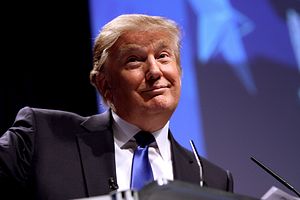It hasn’t been easy to get North Korean diplomats to go on-the-record, but it seems they might be willing to talk about the man that everyone can’t seem to stop talking about: Donald Trump.
North Korea’s representative to the United Nations in Geneva, So Se-pyong, spoke to Reuters regarding the presumptive Republic nominee’s recent suggestion that he would look to open a line of dialogue with Kim Jong-un’s reclusive regime should he become the next U.S. president.
“I would speak to [Kim Jong-un] … I would have no problem speaking to him,” Trump had declared last week.
So wasn’t impressed with Trump’s attempt at an overture.
“It is up to the decision of my Supreme Leader whether he decides to meet or not, but I think his [Trump’s] idea or talk is nonsense,” So, who’d recently returned from his home country after the 7th Workers’ Party Congress, told Reuters.
“It’s for utilization of the presidential election, that’s all. A kind of a propaganda or advertisement,” he added. “This is useless, just a gesture for the presidential election.”
“There is no meaning, no sincerity,” So concludes.
To date, Kim Jong-un has not traveled abroad since taking over from his father as the country’s supreme leader. He has further shown no interest in meeting any foreign leaders.
The North Korean ambassador’s comments might be particularly accurate in this instance. On foreign policy, Trump has shown himself willing to consider many alternatives that would break with U.S. policy continuity in Asia.
After all, if he’s willing to abandon U.S. allies like Japan and South Korea, opening a direct line of communication with North Korea isn’t out of the question.
Curiously, So didn’t address Trump’s accompanying remarks to the overture: “At the same time I would put a lot of pressure on China because economically we have tremendous power over China.”
Ties between North Korea and China have frayed over the past two years, due to a variety of factors. Recently, China took the unusual step of supporting an exceptionally harsh United Nations Security Council resolution sanctioning Pyongyang after its fourth nuclear test in January 2016.
A decision to open direct talks with North Korea without preconditions under a Trump administration would represent a sea-change for U.S. policy toward the country.
The United States has no diplomatic ties with North Korea and currently holds that it will engage in multilateral talks under the rubric of the long-stalled Six-Party Talks with Pyongyang on the condition that the regime first demonstrate its bona fide commitment to denuclearization.
Until Pyongyang makes the first move on denuclearization, the current U.S. administration has decided not to engage in direct bilateral talks and continues to enforce sanctions, adopting a policy that has been described as “strategic patience.”
Direct talks with North Korea, particularly with the country’s nuclear weapons program on the agenda, could also offer de facto recognition of the country as a nuclear weapons state.
The United States, China, and South Korea alike reject the possibility of acknowledging North Korea as a nuclear weapons state.
Policy complications aside, So’s remarks demonstrate that Trump may have to consider that even if he wants to have Kim Jong-un over for man-to-man talks over the best taco bowls at the Trump Tower Grill, Kim might not be in the mood to accept his invitation.
































